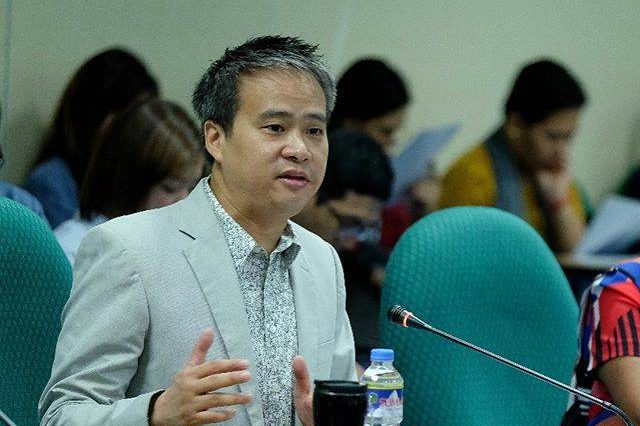SUMMARY
This is AI generated summarization, which may have errors. For context, always refer to the full article.

MANILA, Philippines – Senator Joel Villanueva said on Thursday, February 21, that laxity in regulating Philippine Online Gambling Operations (POGOs) in the country had led to a “loss in government income and opportunities for Filipinos.”
During the Senate labor committee hearing on the influx of foreign workers, Villanueva hit the Philippine Amusement and Gaming Corporation (Pagcor) for “failing to regulate” POGOs, which are under their jurisdiction. (READ: How China’s online gambling addiction is reshaping Manila)
“Sa Pagcor, malinaw ang kanilang papel. They are regulators, but they are clearly failing to regulate. Hindi nagtutugma ang data ng registered POGOs sa data ng BIR (Bureau of Internal Revenue). Lost income for the country and lost opportunities for our countrymen,” Villanueva said.
(The Pagcor’s job is clear. They are regulators, but they are clearly failing at regulating. Their data on registered POGOs don’t match the BIR’s data. That’s lost income for the country and lost opportunities for our countrymen.)
Asked whether Pagcor has a breakdown of the number of foreign employees hired by POGOs, Offshore Gaming Senior Manager Victor Padilla Jr said they don’t.
“I apologize, Sir. We don’t have any data on the employees of POGO. We don’t really regulate the employees of POGO operators. Because, for POGO, the jurisdiction was given to us only in 2016, when we started, so our focus first is in regulating operations itself,” Padilla said.
Villanueva said that Pagcor should strictly monitor the influx of foreign workers brought into the country by POGOs.
“Sa mga kinakasuhan ng NBI (National Bureau of Investigation), inaresto ng BI, puro nasa online gaming. Tapos na’ndito kayo, designated ng estado to protect the interest of this country and our people in the gaming industry, wala kayong masyadong ginagawa to regulate and vet these foreign nationals working here,” Villanueva said.
(Those charged by the NBI or arrested by the BI are usually in online gaming, but here you are, designated by the state to protect the interests of this country and our people in the gaming industry, yet you are not doing enough to regulate and vet these foreign nationals working here.)
Chinese workers
Insiders estimated that there are “easily” around 100,000 to 250,000 Chinese employed in POGOs.
Padilla said that POGO operators “need” to hire Chinese because they speak the language of the patrons.
Padilla also said they do not give gaming employment license or GEL to POGO workers. GEL is a document issued by Pagcor that allows a person to be employed by a gaming employer within the Philippines.
“We dont issue gaming employment license to [POGO] employees. We only issue it to the casinos,” Padilla said.
“Most of the employees in POGO operations are only clerical and desk jobs and are not exposed to gaming. Unlike in casinos that have registers and tables, POGO seems like a BPO. It’s like a call center,” Padilla added.
But Villanueva said that foreign nationals working at POGOs should also be issued GEL, even if there are no physical tables or registers.
“Sana magkaron tayo ng stringent procedures sa paggawa nito. ‘Yung GEL, extend natin. Kasi binigyan ‘nyo lang ng sila (POGO) ng lisensya, eh blanket authority na, ‘Gawin ‘nyo gusto ‘nyong gawin. Bahala na kayo sa buhay ‘nyo’?” Villanueva told Pagcor.
(There should be stringent procedures in place for these operations. Let’s extend GEL to [foreign workers]. Because you only gave POGO the license and they already have blanket authority to do anything they want as they please.)
From 2015 to 2018, Department of Labor and Employment (DOLE) had issued 169,893 alien working permits (AEP), 85,496 of which went to Chinese workers.
AEPs, valid up to 3 years, are required to get a working visa in the country.
Labor Secretary Silvestre Bello III said 35.9% of the Chinese workers with AEP work under administrative and support services. POGOs fall under this category.
Meanwhile, the Bureau of Immigration said it issued 185,000 special work permits from January to November 2018. Of the current valid SWPs, 64,087 of the total 72,010 were given to Chinese nationals.
BI earned P1.2 billion from the SWP transactions, while DOLE only earned P700 million from AEPs.
Foregone revenues
According to Padilla, POGO revenues shot up to P7.365 billion in 2018, almost double of the 2017 estimated record of P4 billion.
In 2016, it was only P657 million because Pagcor was only jurisdiction over them in September 2018.
While the number of workers remains unknown, the BIR said they “do not have the data” whether the operators are withholding taxes from its employees.
So far, BIR said they collect 5% of the total gross gaming receipts.
“Foregone revenues ito. Nanakawan na tayo ng trabaho, nakakawan pa tayo ng karampatang buwis na dapat napupunta sa ating kabang bayan,” Villanueva said.
(These are foregone revenues. Jobs are already stolen, and the right taxes that should have been going to the government’s coffers are being stolen too.)
Recently, an inter-agency task force was created to streamline regulations on offshore gaming operations. The task force is composed of the DOLE, BI, Department of Justice, Department of Finance.
Recent BIR memorandum 78-2018 now requires all foreign and Philippine-based gaming operators to register with the tax agency to renew their licenses. – Rappler.com
Add a comment
How does this make you feel?
There are no comments yet. Add your comment to start the conversation.